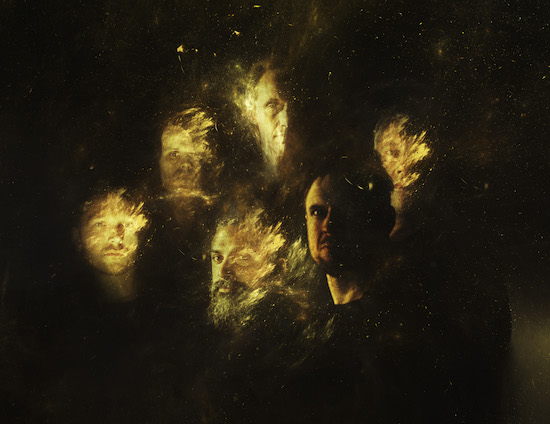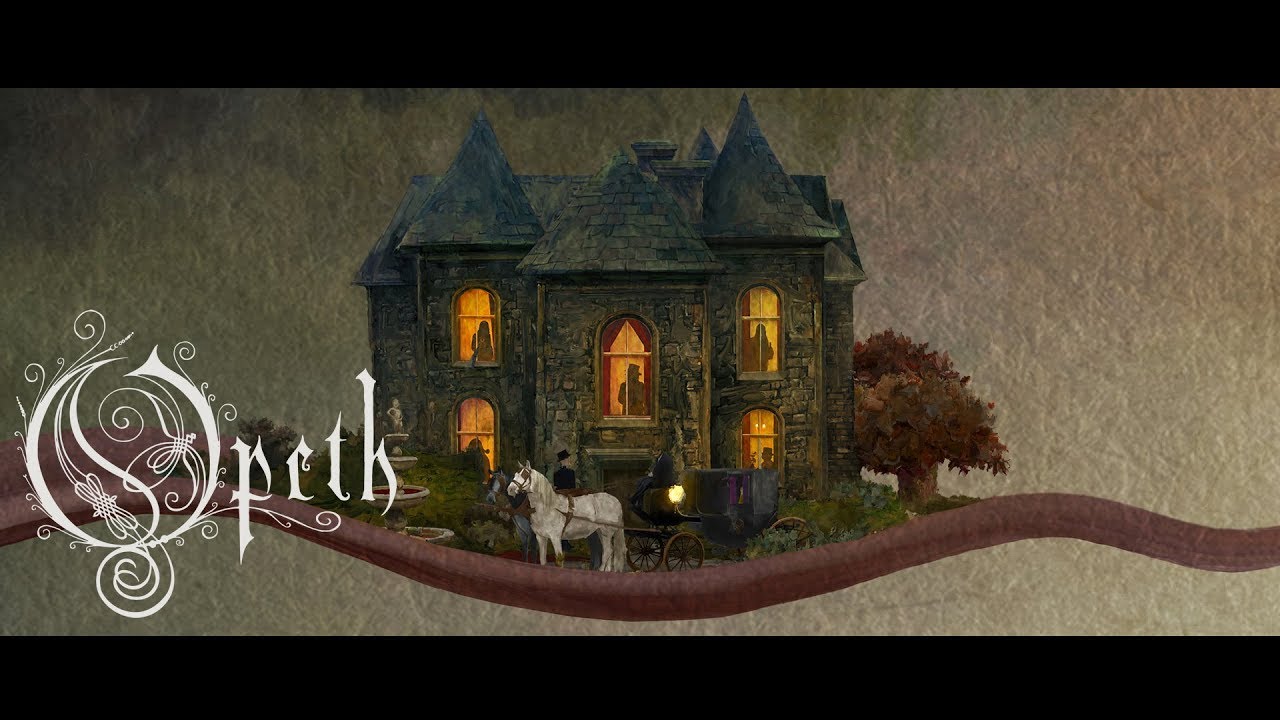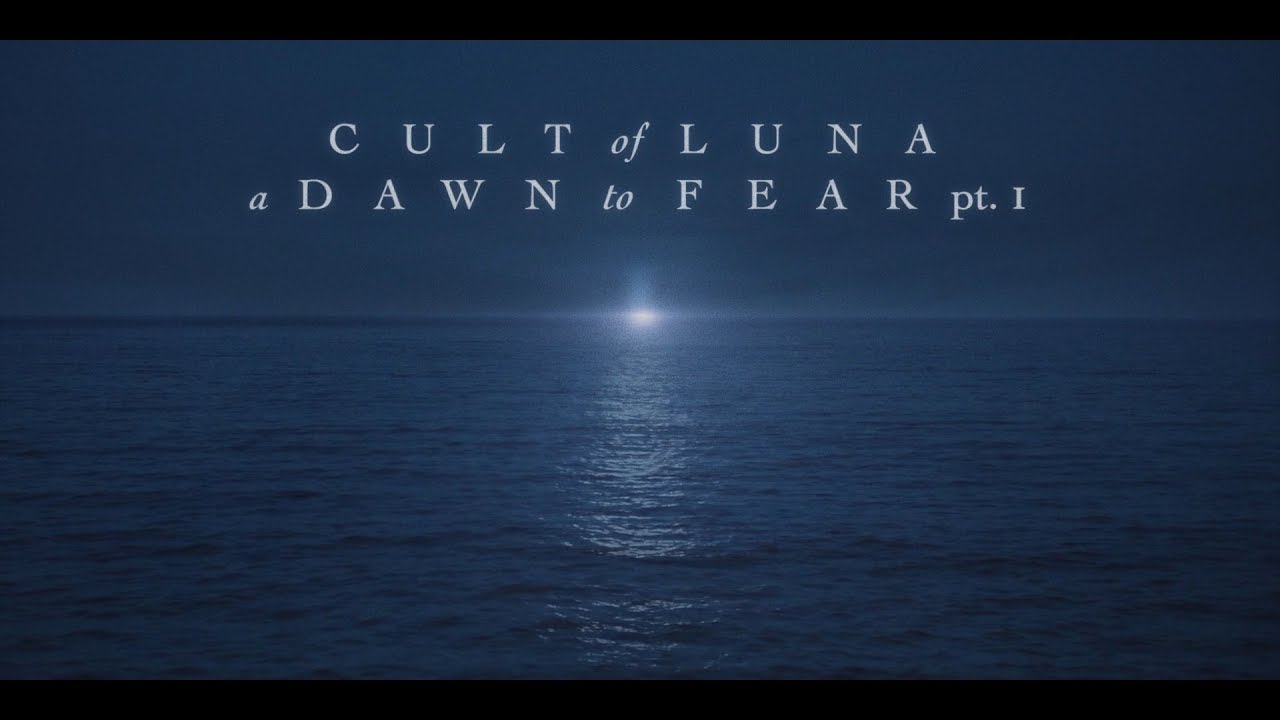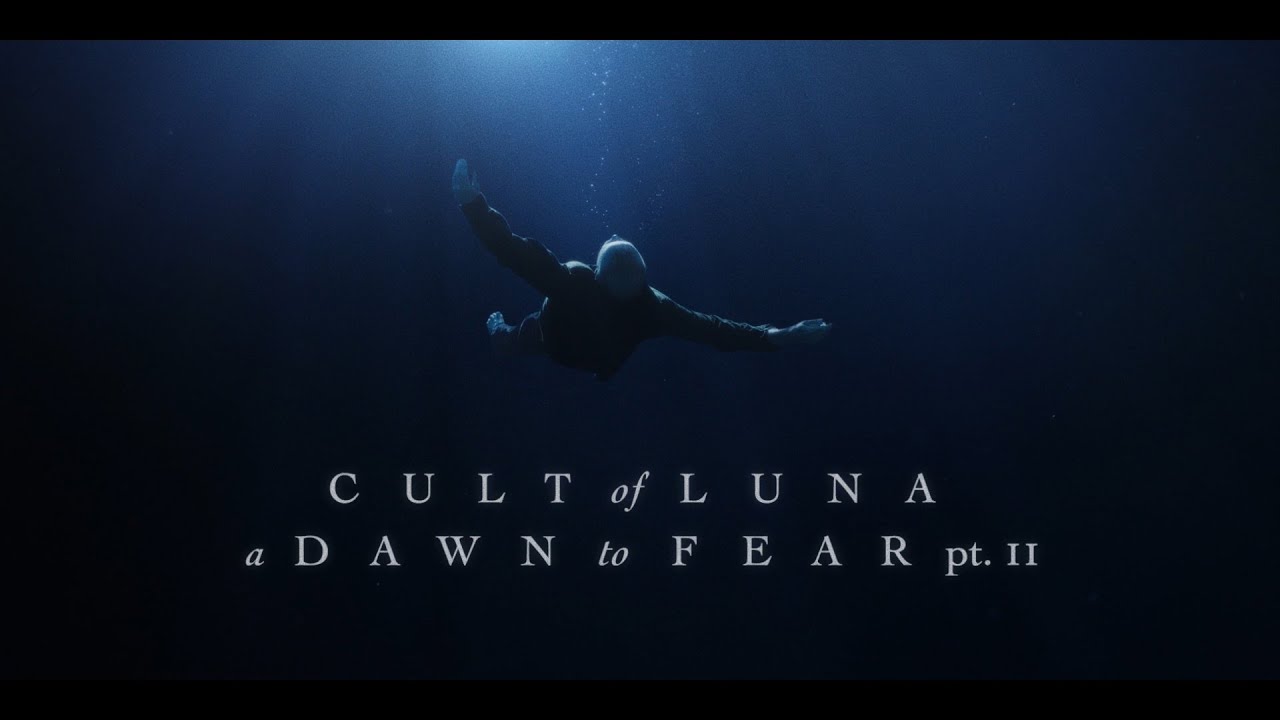Cult Of Luna portrait by Silvia Grav
Johannes Persson has a strange memory. At least, that’s what he thinks. He has a hard time remembering a lot of things, but what he does gets imprinted like a photograph. Writing the lyrics to the song ‘A Dawn To Fear’, the title track of his band Cult Of Luna’s new album, he remembered where he was standing at the beginning of one day in his past, when he witnessed something he would rather forget.
Speaking to me about it, in deference to the other people involved, he demurs going into details. Whatever he witnessed had a huge impact on him, and he distinctly remembers that afterwards he turned around and saw the Ume, the river that flows through the Swedish city of Umeå, running east – towards the dawn: “I thought about the beginning of that day and how so many people did not want to experience it – what was going to happen that day. I wanted that feeling [on the album]; of things that are inevitably going to happen in your life that you really, really don’t want to experience but they’re inevitable – that you need to face sooner or later.”
Cult Of Luna have always operated outside the boundaries of conventional metal music. They signalled it strongly with the title of their 2003 album, The Beyond. It is reflected in the awkward tag that has been given to them since: post metal. With it they join a handful of bands, most prominently Neurosis, who transmuted hardcore punk into a different kind of meandering, beautiful and violent expression. Music best felt rather than explained, on each song the band locks into a central groove, a pathway which, as Persson puts it, “we paint with different kinds of melodies and atmospheres”.
The two years leading into the release of A Dawn To Fear has seen Persson undergo what he calls a “creative landslide”. He spent that time exploring his subconscious, trying to create music intuitively, from the heart, and writing lyrics without knowing what was going to come out on paper, where “one image turns into another one. A sentence comes out, leads to another one.” The best way to access this zone was by playing alone at night, but Persson also had ideas for riffs and melodies recorded on his iPhone with the sound of his five and seven-year-old children screaming in the background. Persson can maintain his creative self with the chaos of daily life all around him, but the nocturnal sessions are where the musician in him wants to be.
As a song, ‘A Dawn To Fear’ materialises slowly out of the gloom. Like others on the album, it begins with crystalline guitars tracing melodies in the air, and in the same way the clouds dissolve in the song’s lyrics, a break for church-service organ makes space for reflection. When the melody is taken up again it is more insistent and the slide guitar imparts that feeling of unease that persists in a lot of Cult of Luna’s music. When the music "drops" – Cult Of Luna are one of the few heavy guitar-based bands that have truly mastered the slow build and drop in the same vein as drum & bass producers – it is not with full force. Here, the band sacrifice amplifier gain and distortion for a solemn, insistent grandeur. It’s the sound of that inevitability Persson wanted to evoke, in what he describes as “quite simple, monotone” music. It was a process not without struggle – the following song on the album, ‘Nightwalkers’, took him almost two years before he was prepared to share it with the band. But before you know it, that song has you by the throat, tightening up and suffocating you with its riff cycles. On this album where the past crashes into the present, there is no escape.
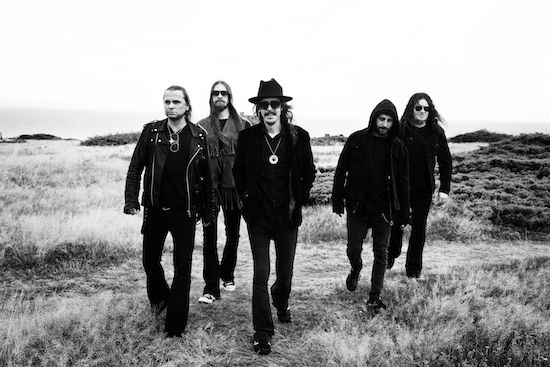
Mikael Åkerfeldt ended the last Opeth album, 2016’s Sorceress, with the song ‘Era’, singing: “The end of an era/ One starts anew/ You know the devil/ He lives in you”. It makes sense that Opeth’s new album has a Latin title, In Cauda Venenum, which translates as “the sting in the tail”. Life beyond death is not new to Opeth: almost every record has concluded on an emphatic note of finality. For Åkerfeldt every album is treated as his last: “With Pale Communion [2014], that ended with a very melancholic, almost nostalgic-sounding song called ‘Faith In Others’, which is one of my favourite songs that I’ve ever written. And [2011’s] Heritage too, I think. So I treated Sorceress as a potential last album, this one is no exception to that.” Opeth made a considerable transition in their sound with Heritage, dropping their death metal growls entirely (on record at least, they remain when the songs demand them live), veered wholeheartedly into a seventies prog rock sound with Pale Communion, and then harder classic rock on Sorceress. Åkerfeldt traces these steps: “The more records you do, the closer to the actual end you are. And this might be it. I’m hoping not. But if it is, I can at least walk away unscathed in that sense.”
With In Cauda Venenum, Åkerfeldt refused the sterility of modern metal production (“it’s almost like you’re in a hospital, it’s so clinical”) and gone for a noisier, dirtier, refined rawness propelled by Åkerfeldt pushing his voice in audacious new directions. By his own admission singing over his abilities at times, he is vying with the greats – the vulnerable and gritty extravagance of performances by Paul Rodgers on Free’s Tons Of Sobs (1969) and David Coverdale on Deep Purple’s Stormbringer (1974).
The Swedish character might be even more self-effacing than the British one, because Åkerfeldt refuses to recognise himself as a great classic rock lead singer. He is outrageously modest: “I very much hesitate to call myself a classic rock vocalist. I don’t even see myself as a vocalist. Or a guitar player, to be honest. I’m just a musician, maybe. I can kind of stretch it to say that I’m a musician. And I have ideas and I want to be able to achieve those goals, so to speak, and somehow I manage. And I think it sounds good and all that, but it’s not really my forte, the actual performance. I can write it, but performing it is much more difficult for me. It’s on there, so at least I did it once."
On the face of it, Opeth have eschewed some of the complexity of their previous albums – the radical chopping and changing between extreme metal and lighter acoustic passages – but In Cauda Venenum has a deeper sound. Going big on dramatic melodic hooks and doubling down on his reputation of being incapable of writing a boring chord, Åkerfeldt has reached beyond rock and pop, to the Swedish folk music that he thinks sits behind the music of Swedish metal act Ghost as much as the pop group Ace Of Base. He even treats me to the chorus of ‘I Saw The Sign’ to make his point.
Presiding over it all is ABBA: “I grew up with ABBA, which is not uncommon being Swedish. And they’re everywhere, of course. And I was born in the same year they won the Eurovision Song Contest [1974] so they were all over everybody’s record collections, they were on the radio, they were on the TV, they were fucking everywhere when I was growing up. But I only discovered them 10 or 15 years ago when I played their music in headphones, and when I had become a bit more of an accomplished musician. I went back to their discography and played songs like ‘When I Kissed The Teacher’ listening through headphones. If you ever do that and listen behind the vocal lines, you will hear the most amazing arrangement. And I started fucking crying like, ‘My God. How is it possible to be that good?’”
There is something else unusual about In Cauda Venenum. It is actually two albums: one is Swedish and one is English. Åkerfeldt got the idea of recording an album in Swedish when he was driving his kids to school one day: “I think the times have changed so much with regard to that kind of universal rock language being English – it’s important I guess to a lot of people but it’s not an obstacle if we were to do it the other way anymore, I think.” Nonetheless he was proud enough of the new music that he didn’t want to risk English listeners skipping it because the album was only available in Swedish. The result is that the songs have an intriguing double-life and lyrically they are altered from being literal translations. The same goes for the song titles: ‘Svekets Prins’ (‘Prince Of Lies’) was deemed too hackneyed and became ‘Dignity’ in English; ‘Hjartat Vet Vad Handen Gor’ (‘The Heart Knows What The Hand Is Doing’) was simplified to ‘Heart In Hand’; ‘Minnets Yta’ (‘Surface Of Memory’) became the more intriguing and pointed ‘Lovelorn Crime’. And then there was the challenge of re-recording the vocals and making sure the translations were right so all the vowels sat comfortably in his vocal register. It was a challenge, rather than a problem, and came at a time when Åkerfeldt felt musically liberated. It also sees Opeth put themselves inside a Swedish musical tradition more clearly than ever before.
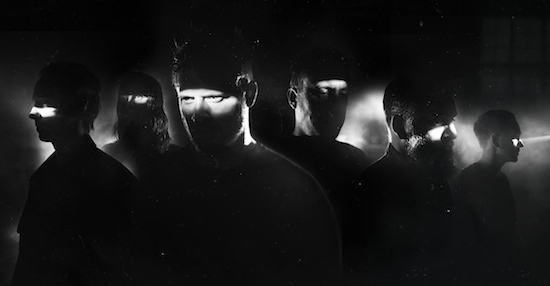
Johannes Persson grew up in the village of Rörbäck (“red creek”) before moving to the city of Umeå. Umeå is remarkable for the nexus of bands that sprung up out of it in the late eighties and early nineties: two of the most famous being punk band Refused and the greatest metal band of the modern era, Meshuggah. It’s taken a long time for Persson to come to terms with what that particular time and place meant for him: “I’ve thought a lot about this period where I grew up as a teenager because when you grow up, the village that I grew up in and the city I moved to, that was my world and I had nothing to compare it to. It did take that many years until I realised that my city had a music scene that’s unique to the world. I mean we had bands like the obvious – Meshuggah, Refused, lot of bands. When I joined my first band when I was 15 years old everybody toured. That was something you were supposed to do. It wasn’t until a couple of years ago that I realised that we’re so old now that people actually look at us as some kind of authority. I’m still a kid in my mind. But I’ve learned to live with that kind of view. I mean we’ve been doing this for 20 years so of course [I recognise it now]. There was most definitely something special with Umeå at that time.”
With a punk attitude that stops for nothing, Persson can get really wound up when he gets the bit between the teeth. Some of our conversation is taken up with him venting about the double standard of a well-known band welcoming back, writing with, and touring, with a lead singer who had, up until recently, been in prison for plotting to have his wife killed. Despite earlier laying into their singer, the reunited band have just released a new album: "The background that I’m from – the musical background – was very much integrated with a lot of ethics and it was a very political scene too, which when you come from that kind of scene you think that everybody else thinks the same way in a sense."
He continues: "So, for example, when a person that just tried to [have his wife killed] – something that happened just a couple of years ago – is out touring and people are happy to have a forgive and forget attitude about it? I cannot get my head around it. I cannot. How is that not a person you now don’t want anything to do with in your entire life?
"How can [journalists] write about that band? There are a thousand other bands you can write about. How can you go to their show? How can they not be constantly questioned every single day about it? I don’t understand because with my background we call bullshit on people.
"However, it might not sound like it, but I’m all for second chances, as long as that person has shown deep regret and I think that some time must-have passed before you can actually see if a person is sincere enough, and most of all you see it through their actions, not through their words. For example, OK, let’s talk about this case right now – I’m not even going to say his name – but if you’re sincerely sorry, like I said: fine. Take all your proceedings, everything from every tour and donate it to a battered women’s shelter. Of course, you can take enough to make ends meet but just saying, ‘I’m sorry’, doesn’t cut it, especially when your band called you a sociopath before. That’s how they work. They adapt to what fits them at this moment. I’m not buying it. You donate your money – at least that’s an action, that’s something that shows you’re going to do something that’s not for yourself. This is also about those coward fucking band members who threw shit on him one second and then when their other band didn’t work well [they welcomed him back] – money talks. That’s how it works."
One thing Persson has held onto since his youth is his unmistakable roar, untrammelled by time or any weakening of his vocal chords. He sees no reason to sell out his screaming, or rationalise a singing style that is instinctual to his musical origins, and just feels right. He adds: “Some things I value – in terms of my core values I don’t back down for anything. That’s where I’m from. I don’t think I’m ever going to change. However, my values have changed. Not my core values, but I think that the 19-year-old Johannes would be quite upset with the 40-year-old Johannes because I have changed a lot of my stance politically. But I would like to argue that my foundational principles are the same, I just adapted them to circumstances.”
This resonated with something I had recently read in a book about artist Edvard Munch by the Norwegian writer (and formerly long-time resident in Sweden) Karl Ove Knausgaard. In it, he describes the slow evolution of the core identity we establish in our teenage years. Writing from the perspective of a man in his forties, Knausgaard says: “In many ways I experienced the world in the same way I did when I was twenty, it was if identity changed much more slowly than life, it crept forward like an oil tanker, and I was the tanker, while the speedboats and cabin cruisers which surrounded it on all sides were the events it related to.”
Persson moved away from Umeå thirteen years ago and for a long time considered moving back unthinkable. Now living on the outskirts of Stockholm, A Dawn To Fear was actually recorded at a remote studio in Norway, on an island with a road of about 6km running around it: sufficient distance for a decent early morning run. Being removed in time and space seems to have confirmed what Persson has been striving to elucidate with the record. As he told me: “The years passed and I realised that things that I value have changed a lot – family and nature and stuff like that has become more and more important: where actually home is. And I would say that’s pretty much the backbone of this whole record and writing session. Trying to figure out what I view as home and what I view as where I want to live and die.”
Like Cult Of Luna as a band, Persson is unavoidably part of Swedish culture “with everything it entails,” as he puts it. This is behind one of the most powerful tracks on the album – one with its roots in history. Cult Of Luna have an ambiguous relationship with historical artefacts since claiming that 2008 album Eternal Kingdom was based on the recovered diary of an inmate of a mental institution (it was a fabrication). Persson promises that the story behind the song ‘Lights On the Hill’ is about the abusive relationship between a real-life Swedish soldier and a shaman of the indigenous Sámi people. In the song, the latter is an outcast owned by the land, time is an enemy in the same way that (as the lyrics put it) “water hollows out stone”, and he has a "will to see the world burn". The lightning-stripped tree of Spå-Klemmet, located in a county near Umeå, commemorates the shaman to this day. The 15-minute song that tells this story, however obliquely, is Cult Of Luna sourcing their sonic tumult in a troubling colonial past.
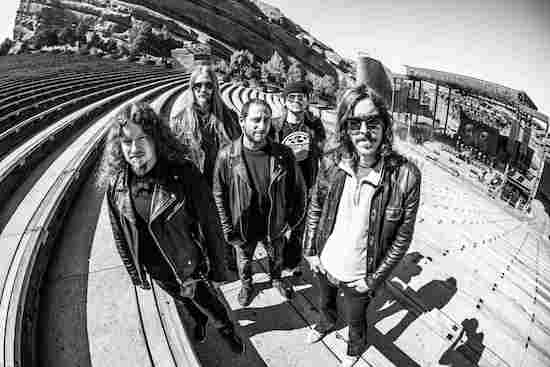
”At a year’s end many will experience a feeling of melancholy, considering that which will never return.” This is a translation of the words of former Swedish Prime Minister Olof Palme from a speech he gave at the turn of the new year in 1969. Palme was assassinated in 1986 – a crime that remains unsolved. Mikael Åkerfeldt uses the sample at the beginning of ‘Svekets Prins’/ ‘Dignity’ and sets the tone of In Cauda Venenum, which both mourns the past and excitedly anticipates the future.
The musical sweep of the album embraces the off-kilter rhythmic stabbing of French prog act Magma and yes, Meshuggah again, on ‘Charlatan’; be-bop piano in the early part of ‘Banemannen’/ ‘The Garroter’; Ritchie Blackmore-esque guitar leads as well as exultant Scott Walker-style strings and orchestration throughout. Ever the record-collecting evangelist, Åkerfeldt waxes lyrical about a recent reissue on the Svart Records of the soundtrack to a 1969 Swedish film called Kamaleonterna (The Chameleon) by trumpeter Lasse Färnlöf: “It’s the best record I’ve heard in fifteen years. I played it so much that I almost wore out the record already.” Opeth are a long way from their song ‘Demon Of The Fall’.
With the samples and a sound that is as deep as it is overblown, Opeth have delivered their best album since Blackwater Park, and one that should prise open the sphere of interest in the band ever wider: “I don’t put the band on a pedestal, if it’s over that’s a shame for me and maybe some other people. But I really wanted to immerse myself in that feeling, I guess. Not only the samples, but overall the songs are quite overblown, pompous and epic, and I wanna go out with a bang, and all that kind of stuff. At some points they’re almost nostalgic, which is maybe the reason why I used Olof Palme, the Prime Minister there. But also what he was saying is something universal, I guess. It doesn’t only connect with this record, it connects with everyone. It connects with anyone who is not even interested in music, if you know what I mean. So I guess it all tied in with my concerns about where we’re going – musically, in life, in general.”
It could be a coincidence that Opeth and Cult of Luna have recorded two of the best albums of their respective careers in 2019. It is more likely to be because they have reached similar points on their journeys without maps. Boundary breaking from the start, both bands have never feared to push their sound and challenge their audiences in the process. It is an unbounded evolution which has paid creative and commercial dividends. By both choosing to look closely at this time and place in their lives, careers, and Swedish culture itself, on A Dawn To Fear and In Cauda Venenum, Persson and Åkerfeldt are not only reconciled with the fact it might all end at any moment – it’s better that way.

